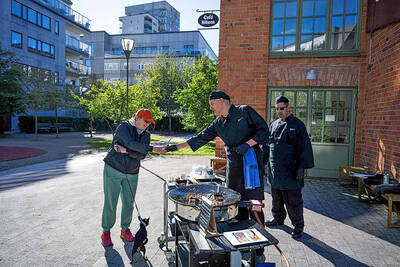It is not in the same league as Arab spring uprisings in Egypt and elsewhere, but Malaysia’s fancifully named “hibiscus revolution” has the potential, at least, to inflict a winter of discontent on the government of Malaysian Prime Minister Najib Razak. That’s something British Prime Minister David Cameron hopefully considered when Najib came touting for business yesterday. Bilateral trade and investment is important. Respect for basic human rights more so.
Najib reacted with characteristic heavy-handedness when tens of thousands of people took to the streets of Kuala Lumpur at the weekend demanding reformasi — democratic reform — and an end to a defective electoral system which guarantees that Najib’s party, UMNO, representing the Malay majority, stays in power indefinitely.
About 1,700 people were arrested and many injured as police used baton charges, water cannon and teargas to break up peaceful protests. One protester, identified as Baharuddin Ahmad, 59, collapsed and later died near the Petronas Towers in central Kuala Lumpur while fleeing teargas.
Amnesty International said police had beaten many demonstrators and demanded an investigation into claims they had failed to provide prompt assistance to Baharuddin.
“Prime minister Najib’s government rode roughshod over thousands of Malaysians exercising their right to peaceful protest,” Amnesty said. “This violent repression ... flies in the face of international human rights standards and cannot be allowed to continue. David Cameron should tell prime minister Najib that these human rights violations are unacceptable.”
The protests are the product of rising tensions linked to mooted early elections, spending cuts, political upheavals in neighboring Thailand and Singapore, establishment cronyism, curbs on public assembly and debate, and state-imposed censorship considered draconian even by regional standards.
Marimuthu Manogaran of the Democratic Action party, representing the ethnic Chinese minority, said many of the protesters were first timers. “Young people [are] coming out there to demand their rights ... and I think that is a good sign for Malaysia,” he told Luke Hunt of the Diplomat magazine.
Another report, denied by police, said a hospital where protesters had taken refuge was attacked by security forces. Bersih 2.0, the opposition “coalition for clean and fair elections,” called for a royal commission of inquiry and vowed to continue its reformasi campaign, come what may.
Far from admitting fault, Najib has threatened more strong-arm tactics.
“Don’t doubt our strength. If we want to create chaos, we can. UMNO has three million members. If we gather one million members, it is more than enough. We can conquer Kuala Lumpur,” he said.
Such threats seem ill-advised. When elected in 2009, Najib promised to bridge political, ethnic and religious divisions. Now he is in danger of exacerbating them, as his old boss, former Malaysian prime minister Mahathir Mohammed, suggested in a recent interview.
Malaysia is not immune to the international zeitgeist, any more than its economy is immune to global trends. This latter consideration explains why Najib is in London and it gives Cameron and other European leaders leverage should they choose to use it.
Malaysians need only look north to see how Thai voters defied the political-military establishment and voted in a leader of their choice. If Malaysians look south to Singapore or east to Hong Kong, they see entrenched ruling elites under determined challenge by activists emboldened by the spirit of change.
Led intelligently and openly, Malaysia could be a paradigm for south-east Asia. Led repressively, it could fall apart. Najib must get on the right side of history. The Mubarak model doesn’t work.

READINESS: According to a survey of 2,000 people, 86 percent of Swedes believe the country is worth defending in the event of a military attack Swedes are stocking up on food items in case of war, as more conflict in Europe no longer feels like a distant possibility, and authorities encourage measures to boost readiness. At a civil preparedness fair in southwest Stockholm, 71-year-old Sirkka Petrykowska said that she is taking the prospect of hostilities seriously and preparing as much as she can. “I have bought a camping stove. I have taken a course on preservation in an old-fashioned way, where you can preserve vegetables, meat and fruit that lasts for 30 years without a refrigerator,” Petrykowska said. “I’ve set aside blankets for warmth, I

FRUSTRATIONS: One in seven youths in China and Indonesia are unemployed, and many in the region are stuck in low-productivity jobs, the World Bank said Young people across Asia are struggling to find good jobs, with many stuck in low-productivity work that the World Bank said could strain social stability as frustrations fuel a global wave of youth-led protests. The bank highlighted a persistent gap between younger and more experienced workers across several Asian economies in a regional economic update released yesterday, noting that one in seven young people in China and Indonesia are unemployed. The share of people now vulnerable to falling into poverty is now larger than the middle class in most countries, it said. “The employment rate is generally high, but the young struggle to

ENERGY SHIFT: A report by Ember suggests it is possible for the world to wean off polluting sources of power, such as coal and gas, even as demand for electricity surges Worldwide solar and wind power generation has outpaced electricity demand this year, and for the first time on record, renewable energies combined generated more power than coal, a new analysis said. Global solar generation grew by a record 31 percent in the first half of the year, while wind generation grew 7.7 percent, according to the report by the energy think tank Ember, which was released after midnight yesterday. Solar and wind generation combined grew by more than 400 terawatt hours, which was more than the increase in overall global demand during the same period, it said. The findings suggest it is

‘ARMED CONFLICT’: At least 21 people have died in such US attacks, while experts say the summary killings are illegal even if they target confirmed narcotics traffickers US forces on Friday carried out a strike on an alleged drug-smuggling boat off the coast of Venezuela, killing four people, US Secretary of Defense Pete Hegseth said. The latest strike, which Hegseth announced in a post on X, brings the number of such US attacks to at least four, leaving at least 21 people dead. An accompanying video shared by Hegseth showed a boat speeding across the waves before being engulfed in smoke and flames. “Four male narco-terrorists aboard the vessel were killed,” the Pentagon chief wrote. He said the strike “was conducted in international waters just off the